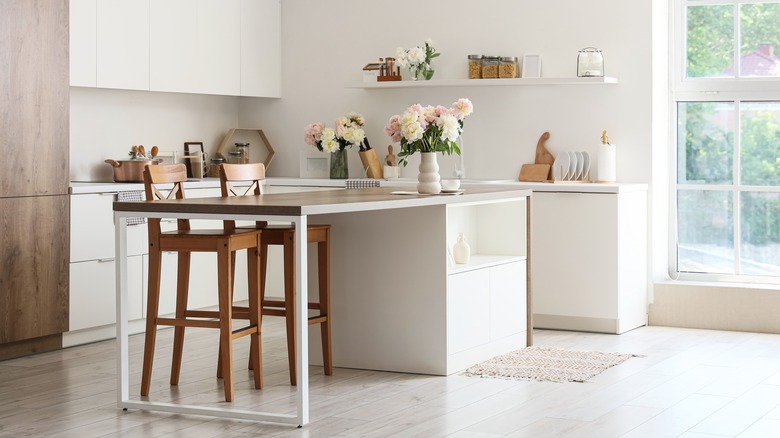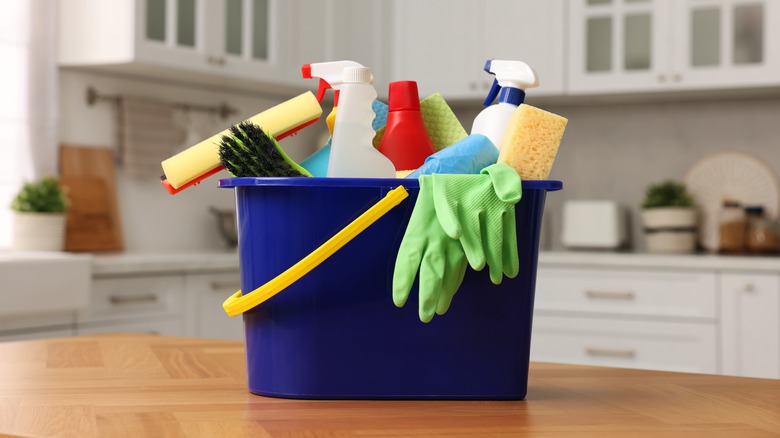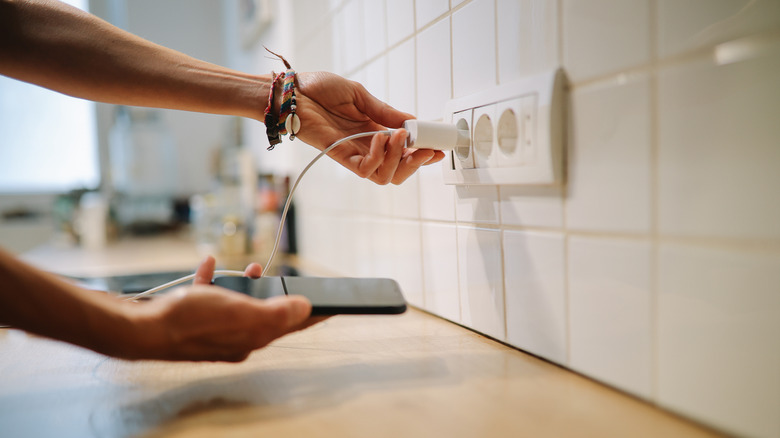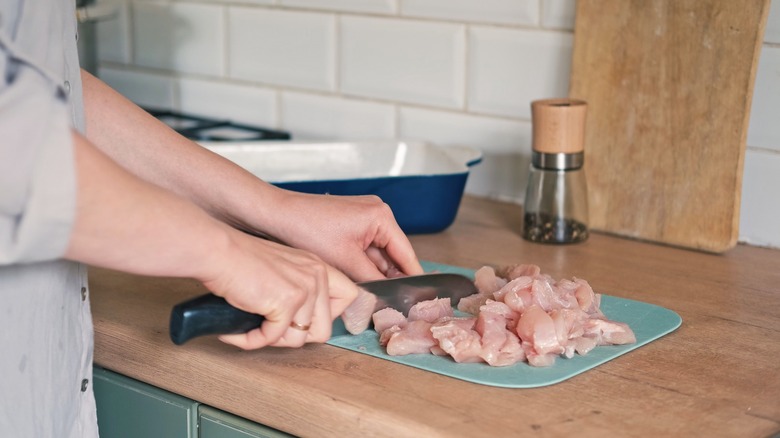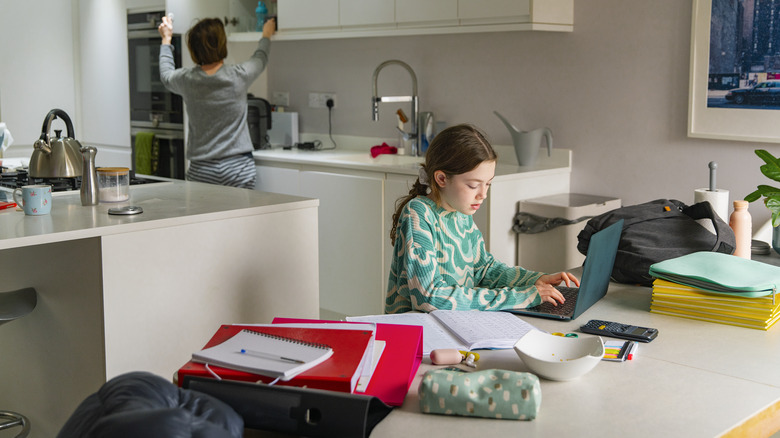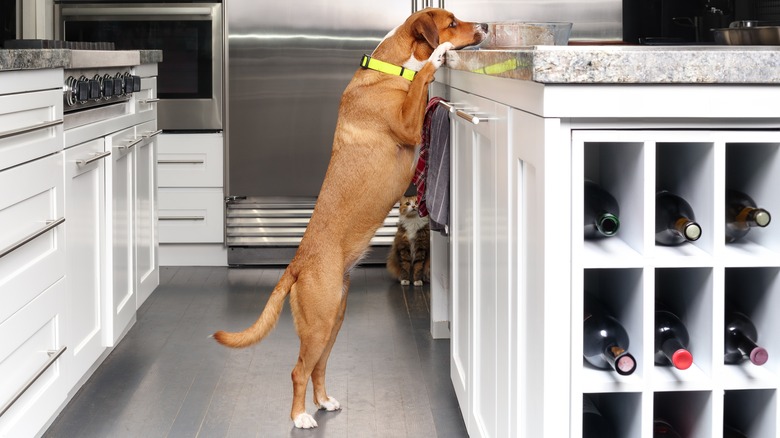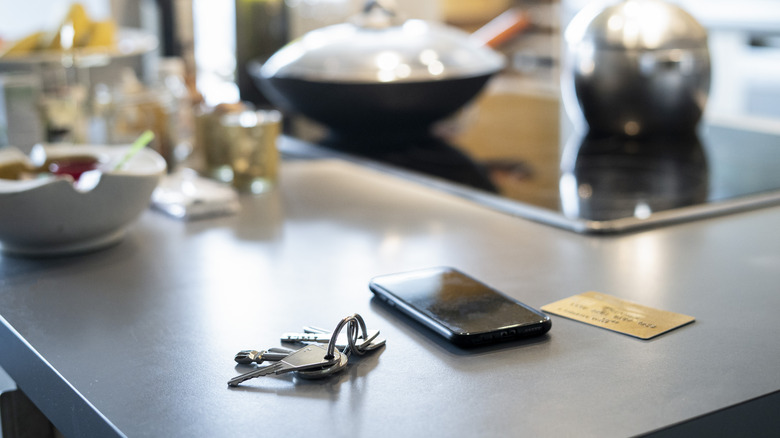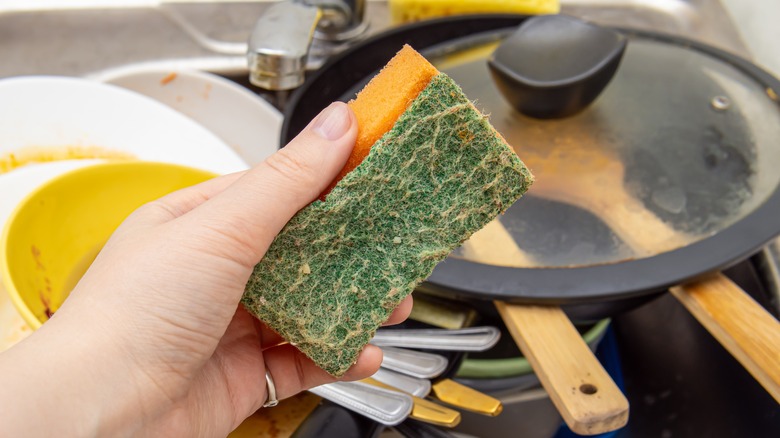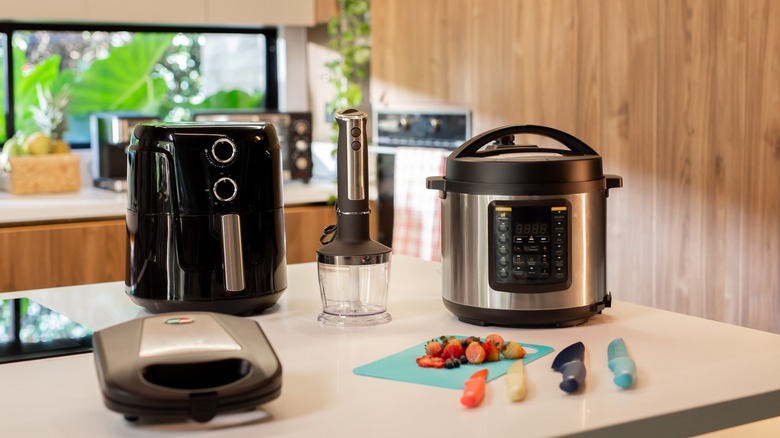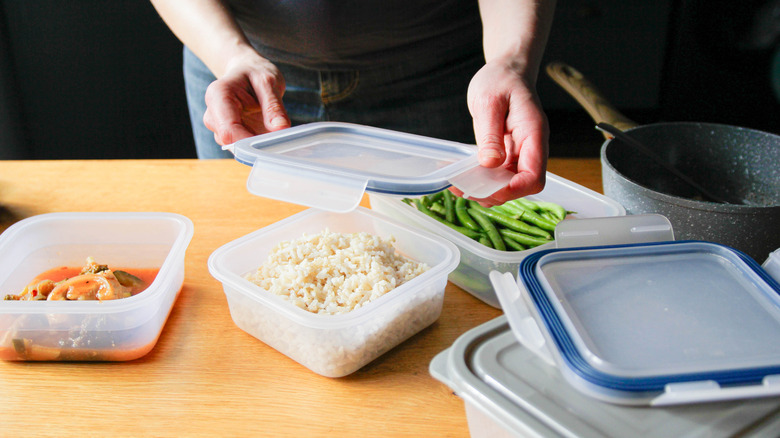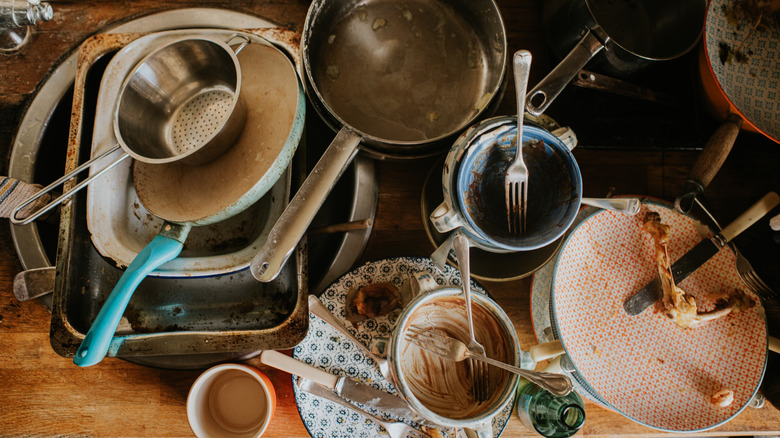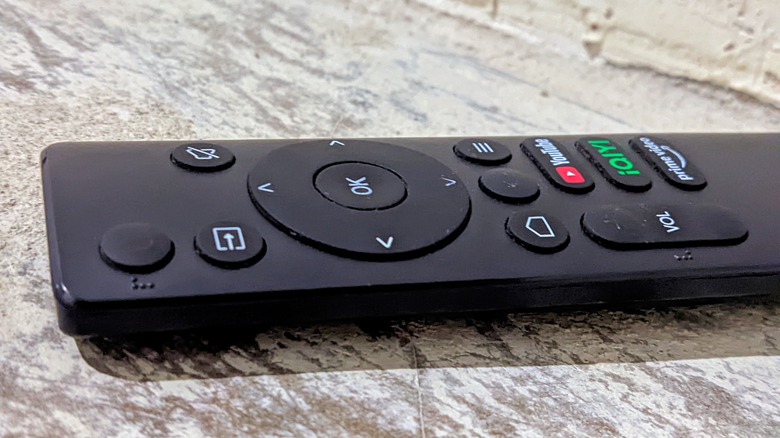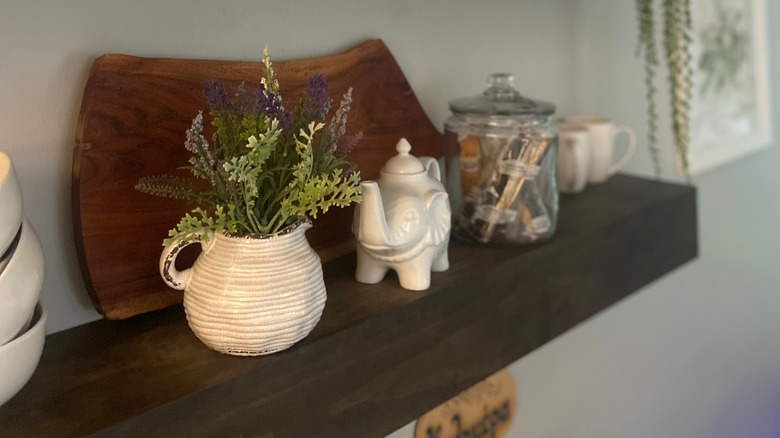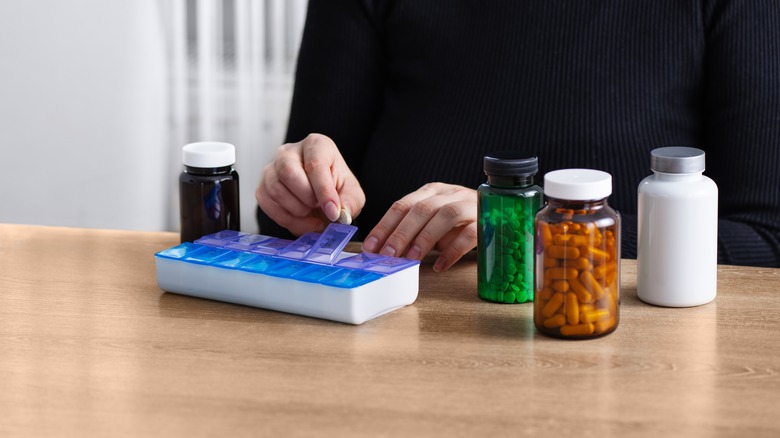Everyday Items That Shouldn't Be Left On The Kitchen Counter
Kitchen counters are supposed to be culinary runways, wide open for chopping onions, boiling pasta, and slicing up a juicy farmers' market melon. Instead, many of us treat them like a dumping ground for life's leftovers. With keys, mail, chargers, yesterday's pastry bag, and a rogue dog leash, suddenly your open concept kitchen feels like a storage unit with a sink and a stove.
That's why knowing what to remove from kitchen counters is just as important as knowing what belongs there. They're food prep zones, which means anything that doesn't directly contribute to eating is either taking up space or, worse, getting dirty and spreading germs.
This isn't about achieving a spotless, HGTV-ready backdrop; it's about keeping your counters functional and (frankly) less gross. That car key fob on the cutting board has seen more gas pump handles than you want to think about, and that pile of mail you've been meaning to go through is basically papier-mache waiting for a spaghetti sauce splash. You may be reluctant to part with the convenience of having everything at your fingertips, but once your kitchen becomes the food sanctuary it was always meant to be, there's no turning back.
Pet leashes and collars
Alright, pet parents, I get it. The kitchen counter is often the last stop before you head out the door, and it seems like a reasonable staging zone for a dog walk. But think about a day in the life of a leash or collar, and you'll think twice about leaving it on your counter. Pet accessories often have outdoor grime, slobber, and germs you don't want on your chopping board or next to your salad. Leaving leashes and collars sprawled on the counter is a recipe for cross-contamination, especially when you're prepping a meal.
Then there's the matter of clutter. Those floppy leash coils can get tangled with other cords or snag your freshly washed dishes, creating a domino effect of mess. There goes your beautiful, minimalist countertop aesthetic. It's better to hang them in a mudroom, a dedicated hook, or even a stylish ceramic crock, far away from anything that's going in your mouth.
Cleaning products
Let's talk bleach, sprays, and power-cleaning potions. Your kitchen counter might seem a convenient spot for a quick squirt, until you realize how easily chemicals can end up in your food prep space. And if you have a small child or a pet at home, it's easy for them to ingest a nasty cleaning product and get sent to the hospital or the vet.
Now imagine you're chopping veggies right next to that bottle of oven cleaner you forgot to cap. A stray drop of chemicals is not the secret ingredient you probably had in mind. Plus, those tall spray bottles are accidental bowling pins waiting to happen; one bump and you're cleaning up cleaning solution.
Instead, stow cleaning products under the sink, in a cabinet away from food. That way, when the mess does strike, they're there when you need them. Your cooking space stays clean, fresh, and safe. If you're worried about your health, you can clean with vinegar, which works well in many instances, but it doesn't fully disinfect surfaces the way some harsher chemicals do. And even so, any cleaning solution on your counter is going to look like clutter.
Chargers and electronics
Gadget lovers, I know your countertop might be doubling as a charging station, but those wires and devices have got to go. Electronics and cooking just don't mix! Your kitchen is humid, splattery, and full of sharp, sticky, or oily situations, making it basically the worst possible habitat for your phone, tablet, or that snake nest of chargers. The countertop is prime splash-zone territory for coffee, pasta water, a rogue blender explosion, and steam from a boiling pot, all of which can condense inside charging ports, causing corrosion that can render them unusable. Oil particles from frying cling to everything in the room, meaning your charger cord can become slick and greasy and can stain anything else it comes in contact with.
Kitchen outlets are often near sinks, and combining water and electricity is a famously easy way to get zapped. With wires in the kitchen, you're also likely creating an obstacle course where a dangling cord can snag on a pot handle, pull a device into the sink, or become a tripping hazard in the middle of dinner service.
Set up your charging station in a dry, low-traffic area away from the stovetop and sink. Your devices will last longer, and your counter will be reserved for more noble tasks.
Raw meat
For a carnivore, raw meat in the kitchen is inevitable, but raw meat hanging out on the countertop is just begging for a bacterial outbreak. When you set a package of chicken or ground beef directly on the counter, you risk transferring Salmonella, E. coli, and other pathogens right onto the surface where you'll later slice bread or assemble a salad. Even if you wipe the counter after, cracks and crevices in the kitchen can trap bacteria that survive cleaning.
Kitchen counters also tend to be room temperature, and provide perfect conditions for bacteria to multiply rapidly if meat sits out while you preheat the oven or answer a text. Instead, take raw meat out of the fridge only when you need it and handle it over a dedicated cutting board, preferably near the sink for easy cleanup. Keep it off the bare counter entirely, and sanitize the area afterward. You can still make beef tartare and other meat-forward delicacies in your kitchen, but do so responsibly.
Mail and documents
Kitchens are often near the entrances to homes, and it's all too easy for them to become mail rooms, but paper doesn't belong there. Kitchens are hazard zones for documents. Steam from a simmering pot can warp paper, and oil particles from cooking cling to wedding invitations and postcards. A splash of wine can turn an important bill into modern art in seconds, and you don't want your kid turning in homework covered in grease stains and smelling like a stale hamburger.
Worse, paper attracts pests. Crumbs from nearby prep or a stray smear of jelly can lure ants or even cockroaches, which think nothing of crawling over your utility statement. And if you keep documents near the stove, open flames or heat from appliances can be a fire risk. Create a mail station outside the cooking zone (a basket by the front door, a slot in your home office, anywhere that's dry and crumb-free) and keep your counter clear for chopping, mixing, and staging your culinary masterpieces.
Pet food
It might seem harmless to scoop Fido's kibble or pour Whiskers' wet food right on the kitchen counter if you're already in food prep mode. But pet food and human food don't belong in the same workspace. Dry kibble can shed fine dust that drifts onto your cutting board or into your dish-in-progress, while wet food can leave lingering smells and oily residue that's hard to fully remove.
Kitchens also run warm, which can speed spoilage for opened pet food. Leave a bag or can out too long and you risk mold growth or attracting pantry pests like grain moths that can spread to other foods. And if your pet jumps up to "self-serve" from the counter, that's an instant contamination event. Keep pet food prep in a designated zone away from your counter, ideally on a washable mat in a mudroom or laundry area. And keep the kitchen for the humans.
Keys
Your keys have been on a grim little tour of every public surface in your life. They've seen gas pumps, grocery carts, public restroom counters, and they're picking up hitchhiking microbes along the way. So it should come as no surprise that your keys are some of the more germ-infested items in your life. Plunking them down next to your cutting board or fruit bowl is like inviting every germ from your commute into your nutritional sanctuary.
Keys are also sharp, and tossing them on a counter can leave scratches in softer surfaces like wood or stone. And in the chaos of cooking, they can snag on dish towels or end up dangerously close to a hot burner if you're not paying attention.
Give your keys a safe, sanitary home outside the kitchen, like on a wall hook by the door, in a bowl in the entryway, or in a drawer. That way, they won't end up marinating in marinara splatter or getting germs on your cutting board.
Dirty sponges
If there's one kitchen item to approach with suspicion, it's a well-used kitchen sponge. Sponges are warm, damp, and full of microscopic food particles, which makes them prime real estate for bacteria. When a dirty sponge sits in direct contact with your counter, that bacterial soup can ooze out onto your food prep space.
Worse, a wet sponge left out in the open can drip dirty water onto the counter and provide a moisture source for mold. It's a bit of a paradox since sponges are tools for cleanliness, but imagine cleaning out your grimy microwave with a sponge and then plopping it on the counter where you're going to prepare dinner.
Instead, wring sponges out completely, store them upright in a holder that allows airflow, and sanitize them regularly in the dishwasher or microwave. You could also switch to a reusable dishcloth. Your counter will thank you, and so will your immune system.
Kitchen appliances
Everyone seems to want kitchen appliances on the counter for easy access, but a kitchen full of appliances makes it look more hazardous than cozy. A counter lined with toasters, coffee machines, blenders, and air fryers quickly morphs into a cluttered showroom, and suddenly there's no space left for your cutting board or mixing bowl.
Appliances that live on the counter are also magnets for grease and airborne particles, and their sleek metal surfaces show every imperfection. Each time you fry bacon or simmer tomato sauce, a fine mist of oil and moisture settles onto surfaces, sticking to your blender base or air fryer vent. Dust settles on top, and before you know it, you're scrubbing sticky grime out of buttons and knobs. Worse, some appliances positioned too close to the stove can overheat or warp, especially those with plastic casings. And you don't want your kitchen appliances all plugged in during a storm in case of an electrical surge.
Rotate, don't accumulate. Store small appliances in cabinets, pantries, or rolling carts away from the stove, and only bring them out when you need them. Not only will your counter stay cleaner, but your gadgets will also last longer when it's not living in a constant haze of steam and splatter.
Cooked rice
It's easy to treat rice like bread, something that can just sit on the counter until you're ready for seconds. But cooked rice is sneaky: It's a common culprit of food poisoning when left at room temperature. Rice often contains spores of a bacterium that survives the cooking process, so when rice is left on a warm kitchen counter, those spores wake up, multiply, and produce toxins that cause illness.
Kitchens, with their fluctuating temperatures and steam, are basically an incubator for bacterial growth. Deep containers of rice cool slowly, meaning the center of that pot can sit in the "danger zone" (between 40 degrees Fahrenheit and 140 degrees Fahrenheit) for hours, giving bacteria plenty of time to thrive.
There is a proper way to store and reheat leftover rice, and it doesn't involve leaving it out on the kitchen counter. Transfer the rice into shallow containers so it cools quickly, then refrigerate it within one hour of cooking. Store it covered to prevent it from absorbing fridge odors, and only reheat what you'll eat immediately.
Dishes
It's tempting to leave a stack of rinsed dishes or a "just for now" pile of dirty ones on the counter, but that habit makes your kitchen less functional and a lot less hygienic. First, dirty dishes are essentially open invitations for bacteria and pests. Even a thin film of food residue can attract ants, cockroaches, or fruit flies, and in the warmth of a busy kitchen, microscopic colonies of bacteria multiply fast.
Clean dishes aren't innocent either. When stacked on the counter instead of being put away, they gather dust, grease, and stray crumbs from cooking. That means your "clean" plate is already contaminated before you even set food on it. Counters should be reserved for prep and cooking, not as overflow storage for dishes.
Rinse and load dirty dishes into the dishwasher immediately, or wash and dry them before they sit. For hand-washers, dedicate a drying rack near the sink away from the area where you do the most food prep. The less real estate dishes claim, the more space you have for chopping, mixing, and plating.
Remote control
Raise your hand if your TV remote has ever migrated into the kitchen. Maybe you were catching up on a show while simmering soup, or scrolling through YouTube cooking videos. Either way, the kitchen counter is not the place for a remote control. First, remotes are famously germ-ridden (they're one of the dirtiest household objects, often harboring bacteria, yeast, and mold).
There's also the physical risk since counters are splash zones. A spilled glass of water or a pot of sauce bubbling too close can ruin your remote. And it also looks messy in a place surrounded by utensils and cutting boards, interrupting the flow of a kitchen designed for food, not Netflix.
Instead, keep remotes in the living room, where they belong. If you like entertainment while you cook, invest in a smart speaker or a tablet stand set up away from the counter. You'll save your remote from sticky hands and save your kitchen food as it was intended.
Excessive decoration
Kitchen counters, we sometimes forget, are spaces for food. Decorative knick-knacks and little potted plants might seem cozy, but in practice, they're just obstacles in one of the most heavily used areas of the house. Cooking produces steam, oil particles, and heat, all of which are not going to do any favors for the framed honeymoon photo next to your microwave. And once dust and grease combine on an object, they're nearly impossible to scrub off.
Decor also takes up valuable counter space you need for actual cooking. A counter cluttered with vases or candles means less room for kneading dough, cutting vegetables, or just spreading out groceries while you unpack.
If you need a little decoration in your kitchen, use open shelving, kitchen walls, or kitchen walls a safe distance from the stove and sink that don't directly interfere with food prep. If you want life on your counters, opt for functional beauty: a colorful fruit bowl or a stylish utensil crock. Nobody wants to butter toast in a forest of tchotchkes.
Medications and pills
I won't argue that leaving medications on the kitchen counter isn't convenient since it's where you grab breakfast, after all, but it's risky for both safety and effectiveness. Heat and humidity are the enemies of most medications. Storing meds in warm, moist environments (like kitchens and bathrooms) can cause them to lose potency faster than they otherwise would. That means your blood pressure pill or allergy tablet may not work as well as intended.
Counters are also famous for unintended splashes of sauces and grease. A pill bottle left out can end up sticky and attracting pests or getting slick and grimy. And if you have kids or pets, keeping medications within easy reach on a counter is a recipe for accidental ingestion.
Your kitchen counter is not a pharmacy. Store medications in a cool, dry place outside of the kitchen, like a bedroom drawer or a hallway cabinet. If you need a visual reminder to take them, set a phone alarm or use a pill organizer you can carry with you. Your meds stay potent, your counter stays clear, and your kitchen goes back to doing what it does best: feeding you.
